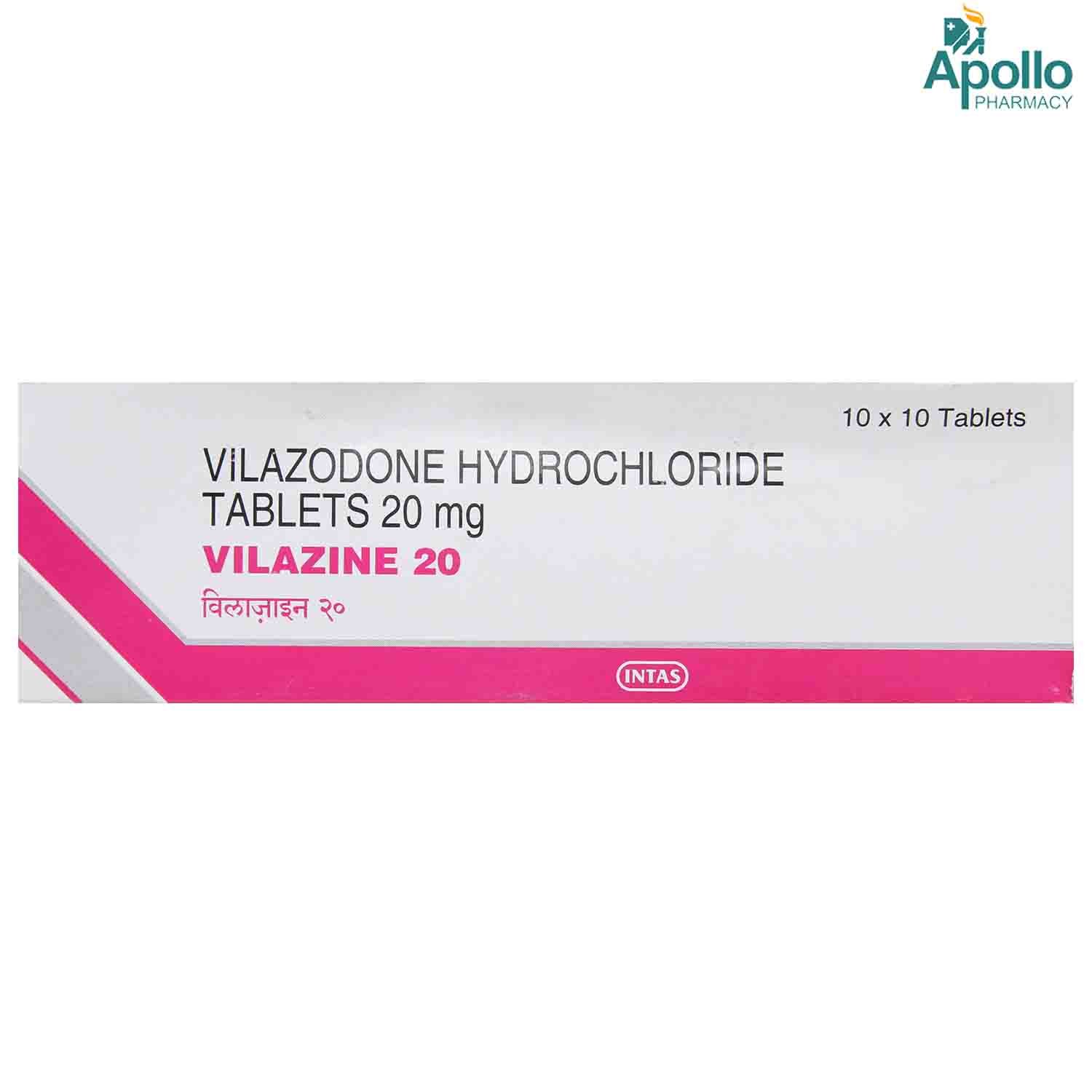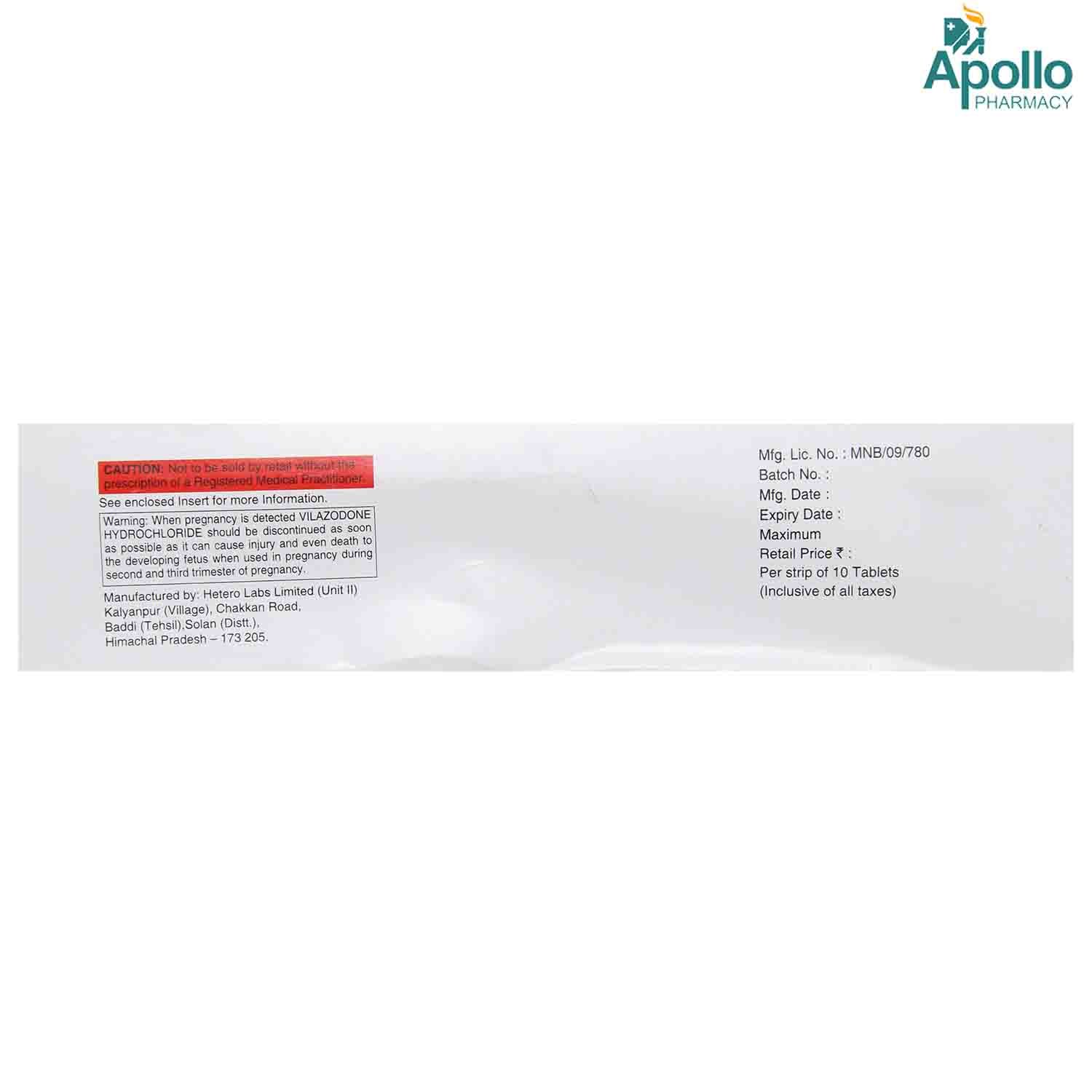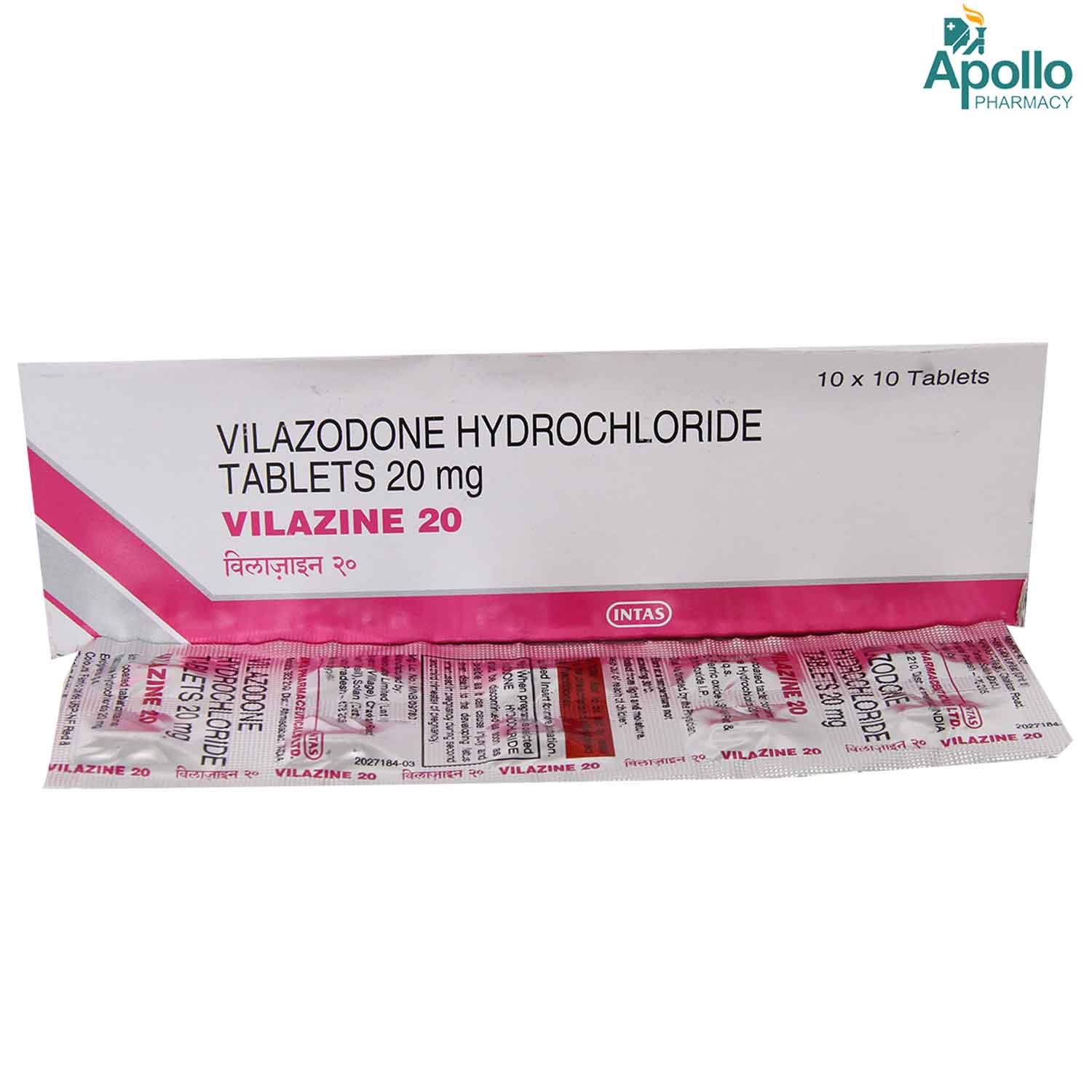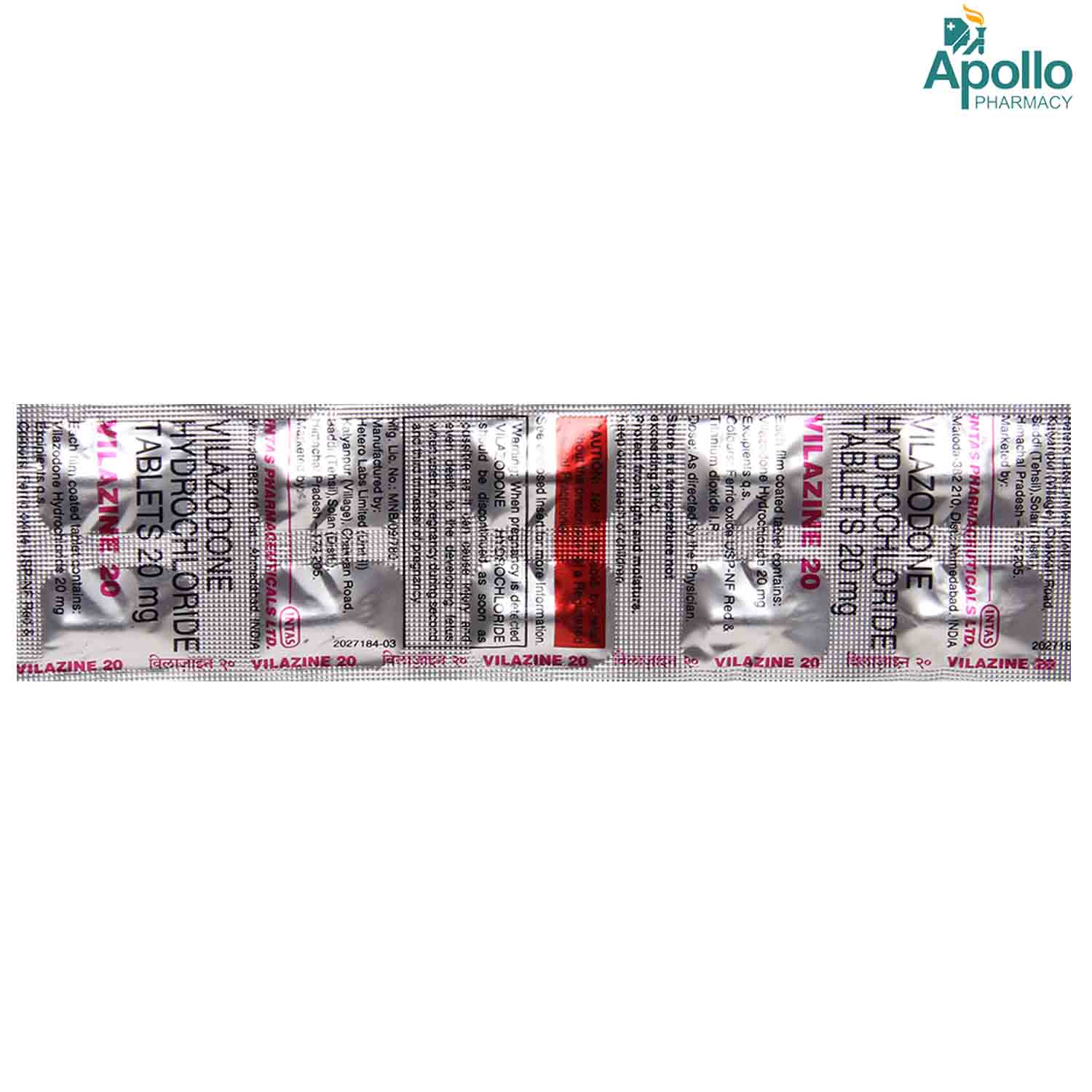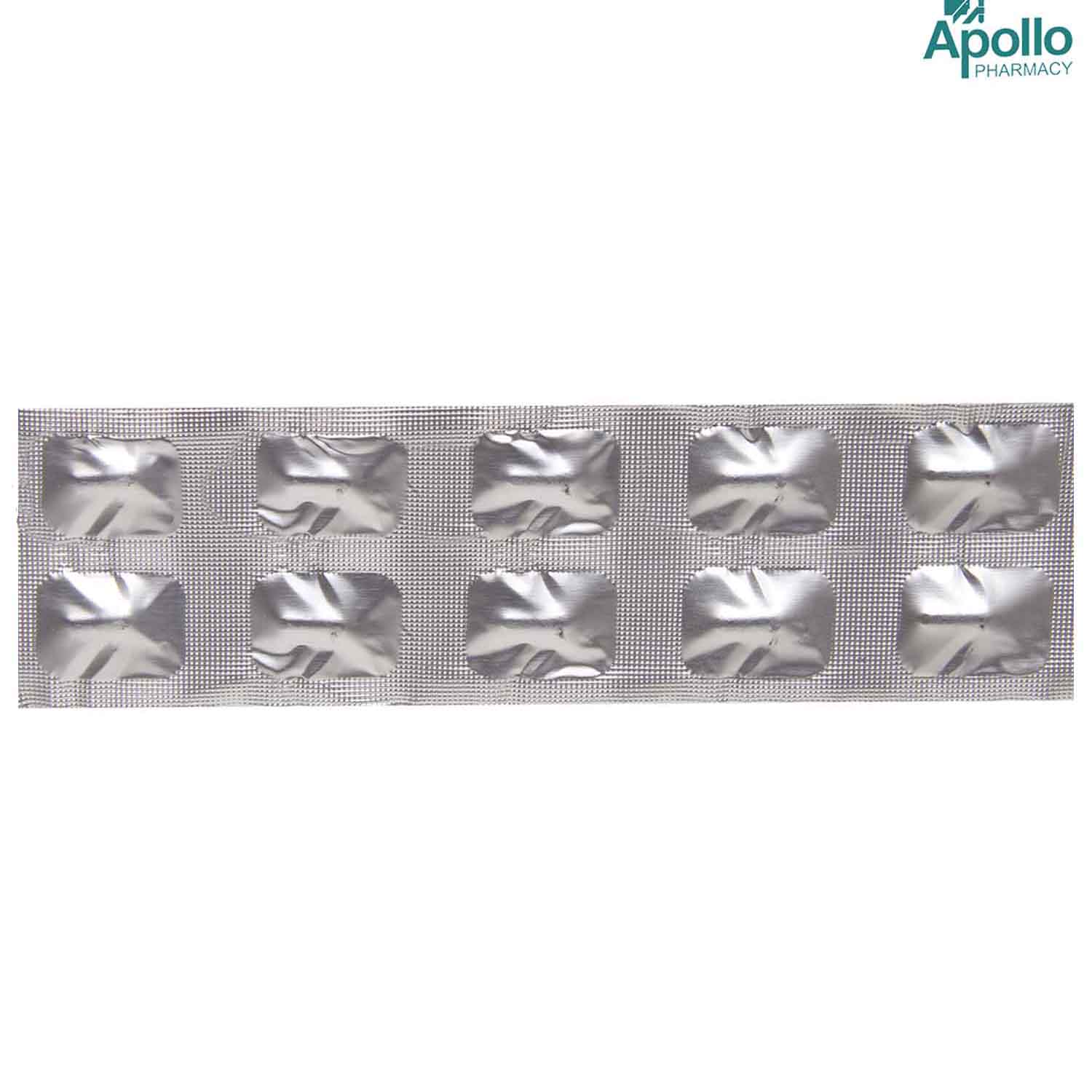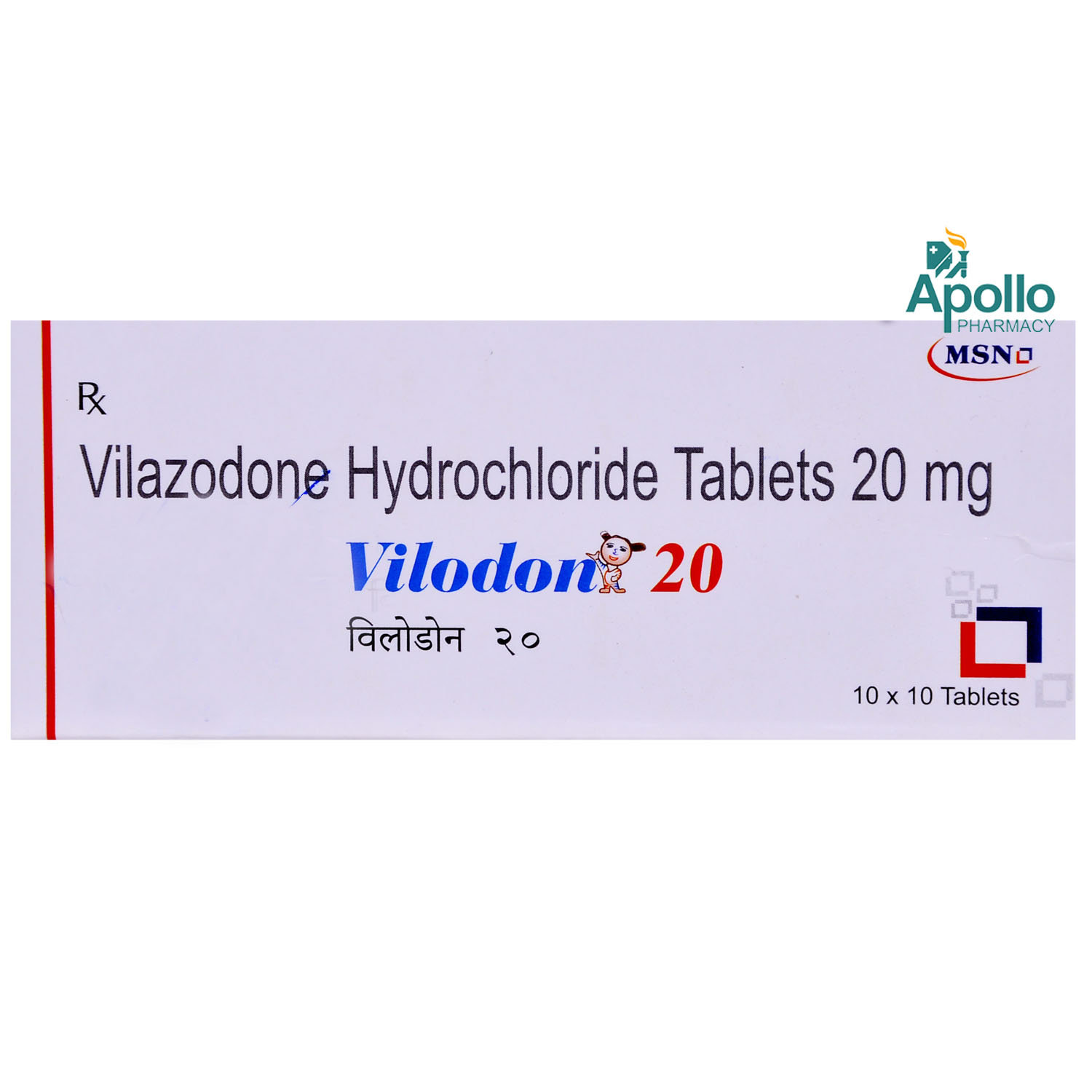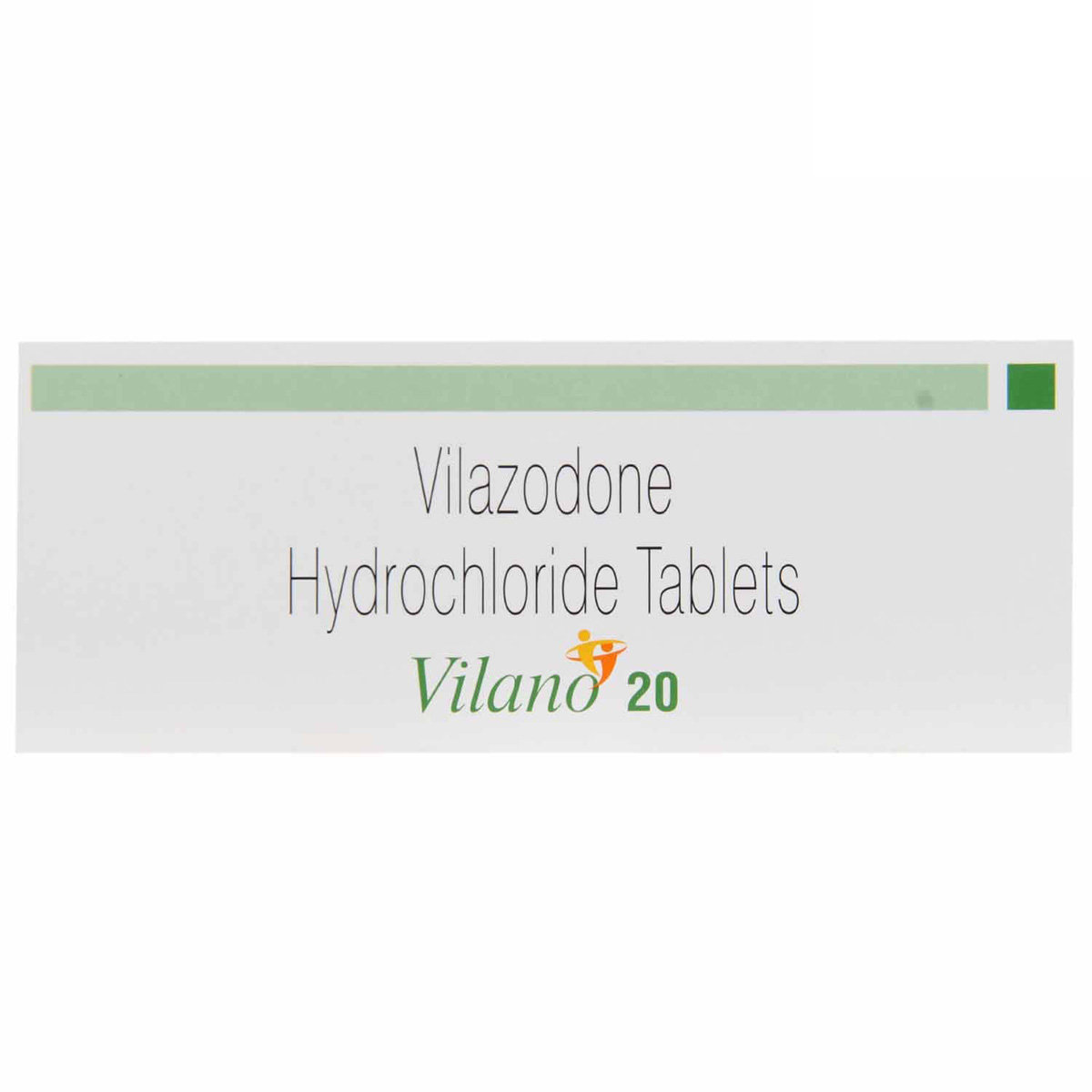Vilazine 20 Tablet 10's
MRP ₹186.5
(Inclusive of all Taxes)
₹28.0 Cashback (15%)
Provide Delivery Location
Online payment accepted
 Prescription drug
Prescription drugWhats That
Composition :
Manufacturer/Marketer :
Consume Type :
Expires on or after :
Return Policy :
About Vilazine 20 Tablet
Vilazine 20 Tablet belongs to the class of medications called ‘antidepressants’ used to treat the major depressive disorder (MDD) or clinical depression. Major depressive disorder, also known as clinical depression, is a mental health disorder characterized by persistent and intense loneliness (nearly every day for at least two weeks).
Vilazine 20 Tablet contains ‘Vilazodone’, which increases serotonin levels (a chemical messenger) in the brain. Serotonin is a hormone that helps improve mood, well-being, and happiness. Hence, an increase in serotonin levels helps to decrease symptoms of depression.
You should take this medicine exactly as prescribed by your doctor. Vilazine 20 Tablet may cause side effects such as diarrhoea, nausea, vomiting, and insomnia (sleeping problems). These side effects usually resolve without requiring any treatment. However, if any of these side effects persist or worsen, inform your doctor immediately.
It is not recommended to take Vilazine 20 Tablet if you are allergic to any contents of it. Before taking Vilazine 20 Tablet , inform your doctor if you have seizures (fits), alcohol abuse, liver or kidney disease, bleeding disorder, glaucoma (an eye condition), and bipolar disorder. Vilazine 20 Tablet should be used with caution in pregnant and breastfeeding women. Vilazine 20 Tablet is not recommended for children or adolescents below 18 years of age as this medicine increase the risk of suicidal tendencies. No dose adjustments are required for elderly patients. It is not recommended to take alcohol as it increases the risk of side effects. Do not drive or operate heavy machinery as it may decrease your alertness.
Uses of Vilazine 20 Tablet
Directions for Use
Key Benefits
Vilazine 20 Tablet is used in the treatment of major depressive disorder. It increases the serotonin hormone levels, which improves mood, energy, and feelings of well-being. It can decrease the number and frequency of depressive episodes. It helps in reducing the symptoms of depression effectively and improves quality-of-life. It can also be used to treat anxiety.
Storage
- Hydrate your body: Drink enough water to prevent dehydration and headaches.
- Calm Your Mind: Deep breathing and meditation can help you relax and relieve stress.
- Rest and Recharge: Sleep for 7-8 hours to reduce headache triggers.
- Take rest: lie down in a quiet, dark environment.
- Cold or warm compresses can help reduce tension.
- Stay Upright: Maintain good posture to keep symptoms from getting worse.
- To treat headaches naturally, try acupuncture or massage therapy.
- Over-the-counter pain relievers include acetaminophen and ibuprofen.
- Prescription Assistance: Speak with your doctor about more substantial drug alternatives.
- Severe Headaches: Seek emergency medical assistance for sudden, severe headaches.
- Frequent Headaches: If you get reoccurring headaches, consult your doctor.
- Headaches with Symptoms: Seek medical attention if your headaches include fever, disorientation, or weakness.
- Eat smaller, more frequent meals.
- Eat slowly and chew your food thoroughly to help digestion.
- Eat fiber-rich foods such as fruits, whole grains, and vegetables to promote regular bowel movements.
- Avoid gas-producing foods like cabbage, beans, broccoli and carbonated drinks.
- Drink lots of water throughout the day to prevent dehydration and aid digestion.
- Do regular exercise to enhance digestion and reduce bloating.
- Drink water or other clear fluids.
- To prevent worsening of pain, limit intake of tea, coffee, or alcohol.
- Include bland foods like rice, toast, crackers, and rice in your diet.
- Avoid lying down immediately after eating as it may cause indigestion or heartburn.
- Avoid acidic and spicy food as it may cause indigestion.
Drug Warnings
It is not recommended to take any monoamine oxidase inhibitors (MAOIs) within the 14 days after stopping Vilazine 20 Tablet or do not take Vilazine 20 Tablet within 14 days after stopping MAOIs. The interaction between these two drugs can be fatal sometimes. Vilazine 20 Tablet may worsen depression and increase suicidal tendencies, so inform your doctor immediately if you notice any unusual changes in your mood or behaviour. Vilazine 20 Tablet may cause serotonin syndrome or neuroleptic malignant-like syndrome, which is characterized by symptoms such as high blood pressure, agitation, confusion, excess sweating, and increased heart rate. In such cases, the doctor may discontinue treatment and provide supportive therapy. Vilazine 20 Tablet may increase bleeding risk when used along with nonsteroidal anti-inflammatory drugs (NSAIDs), aspirin, or blood thinners. Vilazine 20 Tablet may activate mania (abnormally heightened response or energy levels), so patients should be screened regularly for bipolar disorder. Vilazine 20 Tablet may cause hyponatremia (decreased sodium levels in the blood) when used in people with the syndrome of inappropriate antidiuretic hormone secretion (SIADH), a condition in which the body retains too much water. Do not stop taking Vilazine 20 Tablet even if you feel better without your doctor’s advice. Abrupt stopping this medicine may cause withdrawal symptoms such as sleep problems, irritability, and excessive sweating. The doctor may gradually reduce the dose before completely stopping the treatment from avoiding withdrawal reactions.
Drug-Drug Interactions
Drug-Drug Interactions
Login/Sign Up
When Vilazine 20 Tablet is taken with Furazolidone, may increase the risk of serotonin syndrome (a condition in which a chemical called serotonin increases in your body).
How to manage the interaction:
Taking Vilazine 20 Tablet with Furazolidone together can possibly result in an interaction, but it can be taken if a doctor has advised it. However, consult a doctor immediately if you experience any symptoms such as severe confusion, hallucination, seizure, extreme changes in blood pressure, increased heart rate, fever, excessive sweating, shivering or shaking, blurred vision, muscle spasms or stiffness, tremor, incoordination, stomach cramp, nausea, vomiting, and diarrhea. Do not discontinue any medications without consulting a doctor.
When Vilazine 20 Tablet is taken with Phenelzine, may increase the risk of serotonin syndrome (a condition in which a chemical called serotonin increases in your body).
How to manage the interaction:
Taking Vilazine 20 Tablet with Phenelzine together can possibly result in an interaction, but it can be taken if a doctor has advised it. However, consult a doctor immediately if you experience any symptoms such as severe confusion, hallucination, seizure, extreme changes in blood pressure, increased heart rate, fever, excessive sweating, shivering or shaking, blurred vision, muscle spasms or stiffness, tremor, incoordination, stomach cramp, nausea, vomiting, and diarrhea. Do not discontinue any medications without consulting a doctor.
When Vilazine 20 Tablet is taken with Linezolid, may increase the risk of serotonin syndrome (a condition in which a chemical called serotonin increases in your body).
How to manage the interaction:
Taking Vilazine 20 Tablet with Linezolid together can result in an interaction, but it can be taken if a doctor has advised it. However, consult a doctor immediately if you experience any symptoms such as severe confusion, hallucination, seizure, extreme changes in blood pressure, increased heart rate, fever, excessive sweating, shivering or shaking, blurred vision, muscle spasms or stiffness, tremor, incoordination, stomach cramp, nausea, vomiting, and diarrhea. Do not discontinue any medications without consulting a doctor.
Taking Safinamide with Amitriptyline can increase the risk of serotonin syndrome (A condition in which a chemical called serotonin increase in your body).
How to manage the interaction:
Taking Vilazine 20 Tablet with Safinamide together can possibly result in an interaction, but it can be taken if a doctor has advised it. However, consult a doctor immediately if you experience any symptoms such as severe confusion, hallucinations, fits, extreme changes in blood pressure, increased heart rate, fever, excessive sweating, shivering or shaking, blurred vision, muscle spasms or stiffness, shaking, incoordination, stomach cramps, nausea, vomiting, and loose stools. Do not discontinue any medications without consulting a doctor.
When Vilazine 20 Tablet is taken with Isocarboxazid, may increase the risk of serotonin syndrome (a condition in which a chemical called serotonin increases in your body).
How to manage the interaction:
Taking Vilazine 20 Tablet with Isocarboxazid together can possibly result in an interaction, but it can be taken if a doctor has advised it. However, consult a doctor immediately if you experience any symptoms such as severe confusion, hallucination, seizure, extreme changes in blood pressure, increased heart rate, fever, excessive sweating, shivering or shaking, blurred vision, muscle spasms or stiffness, tremor, incoordination, stomach cramp, nausea, vomiting, and diarrhea. Do not discontinue any medications without consulting a doctor.
When Vilazine 20 Tablet is taken with Procarbazine, may increase the risk of serotonin syndrome (a condition in which a chemical called serotonin increases in your body).
How to manage the interaction:
Taking Vilazine 20 Tablet with Procarbazine together can possibly result in an interaction, but it can be taken if a doctor has advised it. However, consult a doctor immediately if you experience any symptoms such as severe confusion, hallucination, seizure, extreme changes in blood pressure, increased heart rate, fever, excessive sweating, shivering or shaking, blurred vision, muscle spasms or stiffness, tremor, incoordination, stomach cramp, nausea, vomiting, and diarrhea. Do not discontinue any medications without consulting a doctor.
Taking Vilazine 20 Tablet and Rasagiline can increase the risk of serotonin syndrome (A condition in which a chemical called serotonin increase in your body).
How to manage the interaction:
Taking Vilazine 20 Tablet with Rasagiline together can possibly result in an interaction, but it can be taken if a doctor has advised it. However, consult a doctor immediately if you experience any symptoms such as severe confusion, hallucination, seizure, extreme changes in blood pressure, increased heart rate, fever, excessive sweating, shivering or shaking, blurred vision, muscle spasms or stiffness, tremor, incoordination, stomach cramp, nausea, vomiting, and diarrhea. Do not discontinue any medications without consulting a doctor.
Co-administration of Vilazine 20 Tablet is taken with Selegiline, which increases the serotonin levels (A condition in which a chemical called serotonin builds up in your body).
How to manage the interaction:
Taking Vilazine 20 Tablet with Selegiline together can possibly result in an interaction, but it can be taken if a doctor has advised it. However, consult a doctor immediately if you experience any symptoms such as severe confusion, hallucination, fits, extreme changes in blood pressure, increased heart rate, fever, excessive sweating, shivering or shaking, blurred vision, muscle spasms or stiffness, shaking, incoordination, stomach cramp, nausea, vomiting, and diarrhea. Do not discontinue any medications without consulting a doctor.
Taking Vilazine 20 Tablet with Tranylcypromine can increase the risk of serotonin syndrome (a A condition in which a chemical called serotonin increase in your body).
How to manage the interaction:
Taking Vilazine 20 Tablet with Tranylcypromine can be taken together if prescribed by a doctor. However, consult a doctor if you experience confusion, hallucination (seeing and hearing things that do not exist), fits, blood pressure alteration, increased heart rate, fever, excessive sweating, shivering or shaking, blurred vision, pain in the muscles or stiffness, incoordination, stomach cramps, nausea, vomiting, and diarrhea. Do not discontinue any medications without consulting a doctor.
When Vilazine 20 Tablet is taken with Sertraline, may increase the risk of serotonin syndrome (a condition in which a chemical called serotonin increases in your body).
How to manage the interaction:
There may be a possibility of interaction between Vilazine 20 Tablet and Sertraline, but it can be taken if prescribed by a doctor. If you notice any of these signs - like confusion, hallucination, increased heart rate, fever, excessive sweating, shivering or shaking, blurred vision, muscle spasm or stiffness, tremor, incoordination, stomach cramps, nausea, vomiting, and diarrhea-contact a doctor right away. Do not stop using any medications without a doctor's advice.
Drug-Food Interactions
Drug-Food Interactions
Login/Sign Up
St. John’S Wort
How to manage the interaction:
Taking Vilazine 20 Tablet with St. John's Wort significantly increases the metabolism of Vilazine 20 Tablet. Avoid taking Vilazine 20 Tablet with St. John's Wort.
Diet & Lifestyle Advise
- Maintain a healthy diet and exercise regularly helps in improving overall health and boosts self-esteem.
- Regularly attend therapy sessions.
- Perform meditation and yoga. This helps in relieving stress and provides relaxation.
- Follow a regular sleep pattern to improve the amount and quality of sleep you get.
- Include foods rich in omega fatty acids such as fish, nuts, fresh fruits, vegetables, and olive oils.
- Neurotransmitters are made up of amino acids. Amino acid-rich foods such as meat, dairy products, and certain fruits and vegetables help maintain neurotransmitters' proper maintenance.
- Complex carbohydrates help in stimulating serotonin (a feel-good neurotransmitter). These include whole grains, legumes, spinach, broccoli, oranges, and pears.
- Exercising helps in the production of the body’s natural antidepressants. It also helps in relieving stress, improving mood, boosts self-esteem, and provides restful sleep.
- Avoid smoking and alcohol consumption.
- Learn about your condition, understand the risk factors, and follow the doctor’s treatment plan.
Side Effects of Vilazine 20 Tablet
- Nausea
- Vomiting
- Insomnia (difficulty in sleeping)
- Dizziness
- Diarrhoea
Habit Forming
Therapeutic Class
All Substitutes & Brand Comparisons
RX
Out of StockVILAREST 20MG TABLET
Cipla Ltd
₹136
(₹12.24 per unit)
27% CHEAPERRX
Vilapad-20 Tablet 10's
Tripada Lifecare Pvt Ltd
₹140.5
(₹14.05 per unit)
16% CHEAPERRX
Out of StockVilamid 20 Tablet 10's
Lupin Ltd
₹171
(₹15.39 per unit)
8% CHEAPER
Drug-Diseases Interactions
Drug-Diseases Interactions
Login/Sign Up
FAQs
Vilazine 20 Tablet contains 'vilazodone' which is an antidepressant. It works by restoring the levels of serotonin in the brain. Serotonin is a hormone or chemical messenger in the brain responsible for improving energy, mood, and emotion levels.
Vilazine 20 Tablet may cause side effects such as diarrhoea, nausea, vomiting, and insomnia (sleeping problems). These side effects usually resolve without requiring any treatment. However, if any of these side effects persist or worsen, inform your doctor immediately.
In case you miss a dose of Vilazine 20 Tablet , do not take a double dose of Vilazine 20 Tablet . If you remember the missed dose before sleeping, take it at that time and take Vilazine 20 Tablet at the same time the next day, which were you taking earlier. If you remember the missed dose the next day, leave the skipped dose, and continue with the next dose.
Yes,Vilazine 20 Tablet cause withdrawal symptoms, if you suddenly stop your medicine even if u feel better. Please reach out a health care professional.
Vilazine 20 Tablet cannot be used in epilepsy or are having electroconvulsive treatment .Vilazine 20 Tablet may increase your risk of having a seizure.
Vilazine 20 Tablet should be used with caution in patients with alcohol abuse, seizures (fits), liver or kidney disease, bleeding disorder, glaucoma (an eye condition), and bipolar disorder, as the Vilazine 20 Tablet may worsen these conditions.
Drug-Drug Interactions Checker List
- SELEGILINE
- TRANYLCYPROMINE
- ISOCARBOXAZID
- AMITRIPTYLINE
- FLUOXETINE
- ST JOHN'S WORT
- HYPERICUM PERFORATUM
- IBUPROFEN
- DICLOFENAC
- ACECLOFENAC
- BUSPIRONE
- WARFARIN
- SUMATRIPTAN
- RIZATRIPTAN
Special Advise
- Inform your doctor that you are taking Vilazine 20 Tablet if you are undergoing any medical or dental treatment.
Disease/Condition Glossary
Major depressive disorder: It is also known as clinical depression and consists of one or more major depressive episodes. A major depressive episode indicates a persistent (nearly every day for two weeks) depressed mood that can interfere with daily activities. The patient may experience at least 5 of the following nine symptoms during a major depressive episode: depressed mood, loss of interest in usual activities, a significant change in weight or appetite, increased or decreased sleep, agitation, increased fatigue, feeling of guilt, or worthlessness, impaired concentration, and suicidal thoughts or behaviour. The exact cause of depression is unknown. However, factors such as stress, changes in hormone levels, alcohol or drug abuse, abuse during childhood, certain medical conditions, and medications might increase the risk of developing depression.

Have a query?
Alcohol
Safe if prescribed
Avoid consumption of alcohol as it may interact with Vilazine 20 Tablet and increase the risk of side-effects.
Pregnancy
Consult your doctor
Vilazine 20 Tablet should be used in pregnant women only when clinically needed and if the benefits outweigh the risks. Please consult your doctor. Your doctor will weigh the benefits and potential risks before prescribing Vilazine 20 Tablet .
Breast Feeding
Consult your doctor
Vilazine 20 Tablet should be used in breastfeeding mothers when clinically needed and if the benefits outweigh the risks. Please consult your doctor. Your doctor will weigh the benefits and potential risks before prescribing Vilazine 20 Tablet .
Driving
Safe if prescribed
Do not drive or operate heavy machinery as Vilazine 20 Tablet may affect alertness.
Liver
Consult your doctor
Vilazine 20 Tablet should be used with caution in patients with severe liver diseases. The dose may have to be adjusted by your doctor.
Kidney
Consult your doctor
Vilazine 20 Tablet should be used with caution in patients with severe kidney diseases. The dose may have to be adjusted by your doctor.
Children
Safe if prescribed
Vilazine 20 Tablet is not recommended in children below 12 years of age.

